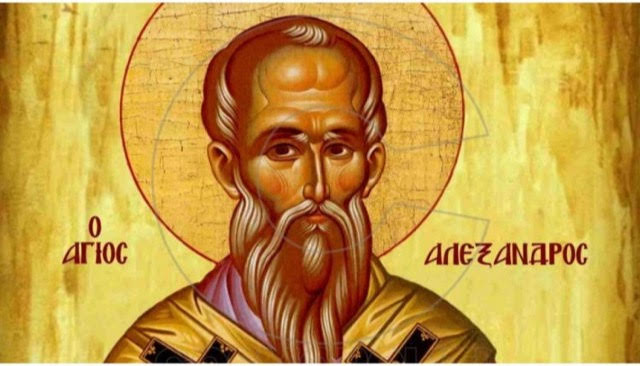
Among the Holy Fathers of our Church, the great figure of St. Alexander is prominent. Born in the year 239 AD to Christian parents, he had the distinction of serving as the first Archbishop of Constantinople. He lived during the great persecutions against Christians ordered by the Roman emperors Decius, Diocletian, Galerius, and Licinius. During those difficult years, St. Alexander tried to protect Christians who were being terrorized, and provide proper burial to the holy relics of the martyrs, with honor and respect. Despite the danger to himself, he continued in this work and the Lord protected him.
At the beginning of the 4th century, St. Alexander was found at the side of the very old bishop of Byzantium, Metrophanes. St. Alexander served there as a deacon, and later as a priest. Bishop Metrophanes reposed in the Lord at the age of 117, and is also numbered among the Saints. The official records of the bishops of Byzantium-Constantinople state that Alexander succeeded St. Metrophanes as the bishop of Byzantium in 314. Later, when St. Constantine the Great established Byzantium as the new capital of the Empire (renamed Constantinople), St. Alexander was elevated to the rank of Archbishop of Constantinople (and the Roman Empire). At the Inaugural ceremonies for the new city, he presided at the first Divine Liturgy in the Church of St. Irene, which had just been completed.
During the years that St. Alexander was Bishop-Archbishop, the widely known heresy of Arius first appeared to disturb the Church. In this time period, the First Ecumenical Council was convened in 325 in the city of Nicaea. The Saint was among the 318 God-bearing Fathers who participated. As we know, the Council condemned the Arian heresy, and in the Creed which was issued from this Council, faith in the three Persons of the Holy Trinity (and in particular the divinity of Jesus Christ) was defined. In order to protect his flock from heresy, St. Alexander began fervently teaching them about the decisions of the Ecumenical Council. He explained the Confession of Faith of Nicaea, and despite being 86 years old, traveled beyond his Diocese to proclaim the true faith in Jesus Christ as true God. At the same time, the Saint diligently carried out his pastoral, catechetical, and charitable duties as Bishop.
A year before his repose in sanctity, St. Alexander faced a great trial. Arius, who had been a priest of the Church of Alexandria, persisted in his heresy. He refused to truly accept the rulings of the Council, and only pretended to accept Orthodox doctrine. He succeeded in deceiving the Emperor, who then ordered Archbishop Alexander to accept Arius as a canonical priest and concelebrate liturgical services with him. This deeply upset St. Alexander, as he knew the spiritual damage this action would inflict upon the Church. The Saint prayed to God all night with burning tears, that such a disaster would not come upon the Orthodox faithful. The God of justice heard him, and the next morning, while the Arians were celebrating their triumph, Arius died in a terrible way.
Archbishop Alexander, having been the pastor of the Archdiocese of Constantinople for 23 years, delivered his holy soul to the Lord in the year 337- the same year that St. Constantine the Great also reposed. On account of his virtuous life and struggles in defense of the Orthodox faith, the Church proclaimed Archbishop Alexander of Constantinople a Saint (placing him among the 62 Archbishops and Patriarchs of Byzantium and Constantinople so honored).
My beloved brothers and sisters, we heard about two men: St. Alexander, Archbishop of Constantinople, and the defrocked and excommunicated priest, Arius. Arius arrogantly believed that he alone held the truth. His disobedience, not only to his Bishop, but an entire Ecumenical Council, set him on the path that would ultimately lead to his horrible death. His refusal to submit to the Council that would have helped him turn away from the false dogmas that he held, resulted in him being defrocked, and cut off from the Holy Church of Christ. For us, Great vigilance is required, in order to remain faithful to Orthodox teachings and not be led astray by heresy (as there are also heretics today). It is equally important that we set aside our own ego, and be obedient to our Orthodox Church, so that we are saved from any form of deception.
While Arius is an example of what to avoid, let St. Alexander remain always in our minds as an example to be emulated. Let us be diligent in knowing the truths of our pure Orthodox faith and what it teaches, and to live as faithful children of the Church. It is in this way that we may also reach the heavenly resting place, where along with the Angels and Saints, offer hymns to the Triune God. Amen.





